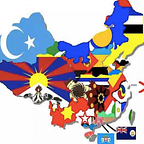中華民族之父松井石根的悲劇與鬧劇
The Tragedy & Farce of Iwane Matsui,Father of the Chinese Nation
文:劉仲敬 譯:SIMON THE CYRENIAN
松井石根作為辛亥革命之父、中華民國之父和國民黨之父,比台北忠烈祠裡面的眾多外籍國父更加當之無愧。他也是孫文和蔣介石的恩人,國民革命在日本的主要辯護人。歷史既有遺產繼承,又有債務繼承。普京現在的困境,很大一部分都是因為繼承了蘇聯在國際上為俄羅斯欠下的債務。北伐當時,日本人心目中的國民黨仍然是辛亥時代的形象。若非日本護犢子,大英早就把蔣介石當拳匪法辦了。南京政府成立後,他目睹蔣介石一步一步倒向斯大林,仍然利用軍界元老和中日友協的身份,多次為國民黨斡旋,深恐親者痛 仇者快,直到戰爭爆發,他對天皇的忠誠,壓倒了私人的友誼。
Compared with all the foreign “founding fathers” enshrined in the National Revolutionary Martyrs’ Shrine in Taipei, Iwane Matsui had the much better claim to this title: He is the Father of Xinhai Revolution, Republic of China, and KMT (Kuomintang, Chinese Nationalist Party). He was the benefactor of Sun Yat-sen and Chiang Kai-shek, as well as the major Japanese defender for KMT’s National Revolution. In the course of history, people inherit not only the heritage, but also the debt. For example, Mr. Putin’s current predicament is mostly due to the international debts Russia inherited from the Soviet Union. During the stage of the Northern Expedition in China (1926–1927), Japanese’s impression on KMT was still the one they had formed in Xinhai Revolution, which drove them to protect Chiang Kai-shek’s regime from the legal punishment of Great Britain, who had the right to identify Chiang Kai-shek as a brutal thug and bring him to justice. After Chiang’s government settled down in Nanjing, though Iwane Matsui personally witnessed Chiang’s gradual collusion with Stalin, he still tried to mediate between KMT and Japan as a revered senior in the Japanese Army and Sino-Japanese Friendship Society, fearing that the possible war will only hurt the friends and entertain the enemies. However, when the war truly broke out, his personal friendship and affection with KMT still had to give way to his loyalty to the Emperor of Japan.
他後來在東京國際法庭上解釋說,日本和中華民國的關係,不是尋常的國與國關係,而是哥哥教訓不爭氣的弟弟。從日本人的禮貌措辭習慣和當時等於常識的歷史事實看,他其實說得太委婉了。國民黨不是日本平起平坐的兄弟,而是日本一口奶一把屎拉扯大的親生孩子。孩子小時候,母親少給一口奶,就能把她餓死,沒有任何人會在乎。孩子十幾歲,開始到處鬧事的時候,母親用一隻手就能把她勒死,卻一再賠錢賠面子,從警察和債主手裡,把這個沒出息的孩子救出來,最後眼睜睜看著她非要嫁給臭名昭著的黑幫老大,明知她會害死自己和以後的子子孫孫,才在她還沒有懷孕的最後關頭,拼命搶她回娘家,結果卻讓這個忘恩負義的孩子聯合黑幫丈夫,叫來不明真相的警察,把母親當成強盜,抓進了派出所。
When he was defending himself in the International Military Tribunal for the Far East, Iwane argued that the relationship between Japan and the Republic of China was never common, but an elder brother giving his disappointing younger brother a lesson. One can easily find that his expression was still way too polite and mild when looking at the inborn roundabout rhetoric of the Japanese people and the then common-sense facts of history. KMT was never an equal brother of Japan, but a child Japan painfully gave birth to and raised with hardship. When the child was still a baby, the mother could easily starve her to death just with some less milk, about which nobody would ever care. When the child grew up to her teenage and started to mess around, the mother could still strangle her to death single handedly, yet she still sacrificed her own property and reputation to save the shameful kid from the police and debtors. Eventually, the mother watched her rebellious girl marrying an infamous gang leader, tried desperately to get her home before she was pregnant, knowing clearly that this daughter would ruin herself and her posterity. Yet it turned out that the ungrateful daughter colluded with her gang leader husband to induce the unwitting police to imprison the mother as a kidnapper.
松井雖然不是法學家,但即使僅憑普通常識,也知道特殊感情和關係,在法庭上根本沒用,之所以還是要說,無非因為事實俱在,患不著操心編故事。他對南京違紀事件的解釋是,自己當時臥病,沒有管好部下,病好以後回來,對違紀人員親自執行了軍法。如果按照人民日報的猥瑣精神,肯定發明成撥亂反正好領導。
Although Iwane was never a jurist, with his common sense, he would still understand that intimate relationships could never justify the accused in the court. His insistence in explaining these was simply because they were obvious facts that no one could make up. His defense for the Nanjing Event was that he was too ill to manage his troops by then and tried to fix things with his personal punishments against the persons involved according to the military law when he returned to the position. Had he been a senior CPC (Communist Party of China) leader in modern China, he could easily be packaged as a prominent leader that put wrongs to right by the People’s Daily (Mouthpiece of CPC) with the despicable style of China.
Koa Kannon. An Avalokitesvara constantly prays for the honorable dead from both sides and a prosperous Asia. General Iwane Matsui was buried here according to his own will.
生病和執法的事情,同樣都是證據確鑿。國際法庭的判決是玩忽職守罪,不是謀殺罪、反人類罪或種族清洗罪,但如果以玩忽職守罪的正常量刑標準,判決就顯得太重,而且尤其錯誤的是,不符合法庭的級別。玩忽職守只是普通犯罪,何須特別法庭。如果鄰居欠債不還,憲法法院會同意受理麼?顯然,英美系法官努力在政治正確和司法準則之間維持平衡。如果冷戰以後再審,松井大概連被起訴資格都沒有。如果說松井的一生符合悲劇的定義,英雄人物為自己的原則不得不犧牲;中華民族發明學就符合鬧劇的定義,認真你就輸了。
There were solid proofs for his illness and punishments against the persons involved in the Nanjing Event. The International Military Tribunal’s sentence was “Dereliction of Duty” instead of murder, crime against humanity, or genocide. His sentence appeared to be too severe with the sentencing criterion of “Dereliction of Duty”. Moreover, there was a appalling mismatch between the level of sentence and the level of the court. Why on earth should a special court be needed for a common dereliction of duty? If a neighbor of yours refuse to pay his debt to you, will the constitutional court accept and hear such a case? Evidently, the western judges were trying their best to strike a balance between political correctness and judicial criteria. Should Mr. Iwane got the chance to be judged after the Cold War, he would probably not be accused at all. If Mr. Iwane Matsui’s life can be seen as a tragedy where the hero had to sacrifice in order to hold fast to his principles, the construction of the so called Chinese Nation can definitely be qualified as a farce, where seriousness leads only to the wrong end.
